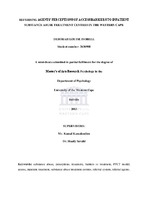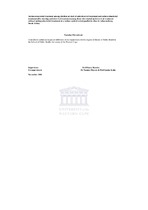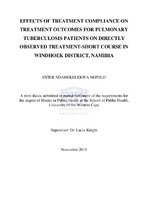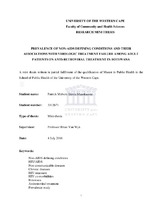| dc.description.abstract | High rates of substance use and its associated problems afflict Cape Town, underscoring the
need for easily accessible substance abuse treatment. Despite the substantial benefits for both
individuals and society at large that substance abuse treatment confers, substance abusers
often first have to negotiate considerable challenges in order to access treatment and
accumulate these gains. That is, experiencing barriers to accessing treatment, together with
the presence of socio-demographic features, rather than “need for treatment”, decides who
accesses treatment. Referrals are the gateway to inpatient substance abuse treatment in the
Western Cape. While several barriers to accessing treatment have been identified by prior
studies, none examine these phenomena from the point of view of the agents responsible for
referring substance users for treatment. Moreover, access barriers to inpatient substance
abuse services are a neglected area in extant literature. To address this gap, this study
explored the perceptions of referring agents‟ of the barriers to accessing state-funded
inpatient substance abuse treatment centres in the Western Cape. This enabled the researcher
to compare existing access barriers to treatment as identified by prior research, to those
elucidated in the study. Bronfenbrenner‟s Process-Person-Context-Time model was
employed as the basis for understanding identified barriers. In accordance with the
exploratory qualitative methodological framework of the study, six semi-structured individual
in-depth interviews were conducted with referring agents‟ of differing professional titles who
were purposefully selected and expressed a willingness to participate in the study. Interviews
were audio-recorded, and transcripts were analysed and interpreted by means of Thematic
Analysis. Two broad thematic categories of access barriers were identified: Person-related
barriers (denial, motivation for treatment, gender considerations, disability, active TB
disease, homelessness, psychiatric co-morbidity) and Context-related barriers to treatment
(cultural and linguistic barriers, stigma, community beliefs about addiction and treatment,
awareness of substance abuse treatment, affordability/ financial barriers, geographic locations
of treatment facilities, waiting time, lack of collaboration within the treatment system, beliefs
of service providers‟, lack of facilities/ resources within the treatment system, practices at
inpatient facilities, referral protocol and uninformed staff). Results suggest that by targeting
the aforementioned barriers, access to inpatient and outpatient treatment services can be
improved, and recommendations for interventions are offered in this regard. Ethical
principles such as obtaining informed consent and ensuring confidentiality were abided by
throughout the study and thereafter. | en_US |
| dc.subject | substance abuse, perceptions, treatment, barriers to treatment, PPCT model, access, inpatient treatment, substance abuse treatment centres, referral system, referral agents. | en_US |




